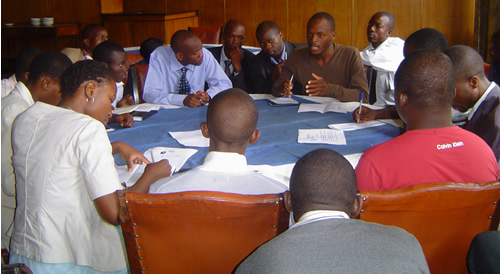Gwisai and other activists found guilty
Tuesday, March 20th, 2012 by Lenard KamwendoHarare magistrate Kudakwashe Jarabini yesterday delivered a ruling in the Munyaradzi Gwisai and five others’ case in which they are accused of inciting public violence. Mr. Jarabini found the accused guilty on charges of inciting public violence. Before he found the accused guilty, Mr. Jarabini addressed the court and he said, “It is not an offence to view video footage, the motive behind viewing of the footage of events which took place in Egypt and Tunisia on that particular day was not for a good cause and was meant to instill feelings of hostility against the government.”
Gwisai is jointly charged with fellow activists Welcome Zimuto, Hopewell Gumbo, Antonater Choto, Tatenda Mombeyarara, and Edson Chakuma. The charges arose from a meeting, which was convened at the offices of the International Socialist Organisation – Zimbabwe Chapter in Harare in February 2011. Forty-five people were arrested during the meeting and later charged with treason. Treason charges were later dropped and 39 people were released in March after spending close three weeks in prison. The state later preferred a lesser charged of inciting public violence after High Court Judge Samuel Nyakudya ruled that the case against Gwisai and his colleagues was weak.
” I see no iota of evidence that any Zimbabwean ever contemplated a Tunisian and Egyptian revolution,” Nyakudya said in his ruling.
The case was referred back to the magistrates Courts for trial after the accused had been granted $2000.00 bail each by the High Court. Defence led by prominent human rights lawyer Alec Muchadehama successfully sought for an adjournment to today to prepare for mitigation. Under section 36 of the Criminal Law Codification and Reform Act, public violence attracts a prison sentence of up to ten years, a fine or both.










